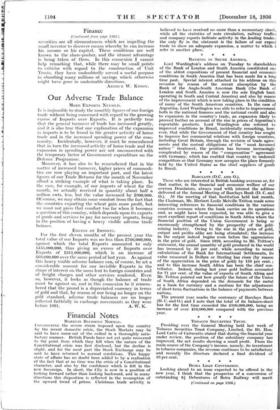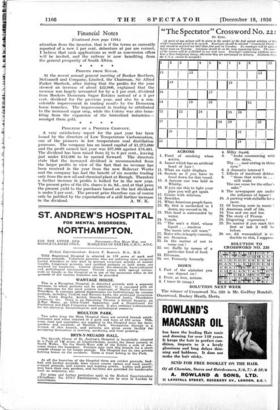Financial Notes
MARKETS BECOMING NORMAL.
CONSIDERING the severe strain imposed upon the country by the recent domestic crisis, the Stock Markets may be said to have come out of the ordeal in a thoroughly satis- factory manner. British Funds have not yet quite recovered to the point from which they fell when the nature of the Constitutional crisis was first disclosed, but the decline is slight, and for the most part the Stock Exchange may be said to have returned to normal conditions. This happy state of affairs has no doubt been added to by a realisation of the fact that at no time was the crisis of a Constitutional character, and also by, the confidence which is felt in the new Sovereign. In short, the Ci:ty is now in a position of looking forward rather than looking backward, and in many directions this disposition is reflected in the resumption of the upward trend of, prices. Christmas trade activity is believed to have received no more than a momentary check, while all the statistics of note circulation, railway traffics and company .reports indicate-activity, in the leading trades ; the only fly in the ointment is the failure of our export trade to show an adequate expansion, a matter to which I refer in another place. '
* * * * BANKING IN SOUTH AMERICA.
Lord Wardington's address on Tuesday to shareholders of the Bank of London and South America constituted one of the ablest expositions of present financial and economic conditions in South America that has been made for a long time past. Special interest attached to his address on this occasion by reason of the recent absorption by the Bank of the Anglo-South American Bank (the Bank of London and South America is now the sole English bank operating in South and Central America) and also by reason of the improvement which is now taking place in the condition of many of the South American countries. In the, case of Argentina, Lord Wardington was able to refer to improvement both in the national finances and the national credit and also to expansion in the country's trade, an expansion likely to proceed further on account of the rise in prices of Argentina's exportable products. Lord Wardington also referred to improved conditions in Brazil, incidentally remarking, how- ever, that while the Government of that country has sought to improve her commercial relations with foreign countries, including Great Britain, through the revision of trade agree- ments and the mutual obligations of the "most favoured nation" treatment, the position has become increasingly complicated by reason of the "compensation " agreement with Germany, which has enabled that country to undersell competitors so that Germany now occupies the place formerly held by the United States as the chief suppliers of goods to Brazil.
* * * *
BARCLAYS (D.C. AND 0.).
Those who are interested in British banking overseas or, for that matter, in the financial and economic welfare of our oversea Dominions, always read with interest the address delivered at the Annual Meeting of Barclays Bank (D. C. and 0.). At the meeting of that Institution held last month, the Chairman, Mr. Herbert Leslie Melville Tritton made some interesting references to financial conditions in the various countries overseas where the bank carries on its operations and, as might have been expected, he was able to give a most excellent report of conditions in South Africa where the financial position of the Union Government is being so enormously strengthened by the prosperity of the gold- mining industry. Owing to the rise in the price of gold, output and profits alike are being stimulated; the increase in the output indeed begins even before the appreciation in the price of gold. Since 1929, according to Mr. Tritton's statement, the annual quantity of gold produced in the world has increased by 50 per cent. while according to recent calculations of the Bank for International Settlements, its value measured in Dollars or Sterling has risen (by reason of the appreciation in the price of gold) by 150 per cent. ; and to this increase South Africa has been the chief con- tributor. Indeed, during last year gold bullion accounted for 71 per cent, of the value of exports of South Africa and Mr. Tritton pointed out how greatly the future of the Union of South Africa depended on the demands for the metal as a basis for currency and a medium for the adjustment of short-term fluctuations in the balance of payments between nations.
The present year marks the centenary of Barclays Bank (D. C. and 0.) and I note that the total of its balance-sheet has for the first time exceeded the £100,000,000, being an increase of over £10,000,000 compared with the previous year.
* * * * TOBACCO SECURITIES TRUST. Presiding over the General Meeting held last week of Tobacco Securities Trust Company, Limited, the Rt. Hon. Lord Catto of Cairncatto stated that during the financial year under review, the position of the subsidiary company has improved, the net results showing a small profit. From the main source of the Company's income, namely, its investment in tobacco companies, the revenue continues to be satisfactory and recently the directors declared a final dividend of 10 per cent.
* * * *
BEIRA LOAN CorivEnsiorr.
Looking ahead to an issue expected to be offered in the new year, I think that the prospectus of a conversion of outstanding 6i Debentures of Beira Railway will merit (Continued on page 1106.)
Financial Notes
(Continued from page 1104.)
attention from the investor, that is if the terms as currently reported of a new 5 per cent. debenture at par are correct. I believe that cash applications as well as conversion offers will be invited, and the railway is' now benefiting from the general prosperity of South Africa.
PROFITS FROM SUGAR.
At the recent annual general meeting of Booker Brothers, McConnell and Company, Limited, the Chairman, Sir Alfred Parker Sherlock, after stating that the profits for the year showed an incresse of about £22,000, explained that the increase was largely accounted for by a ,5 per cent. dividend from Bookers Demerara Sugar Estates instead of a 3 per cent, dividend for the previous year, and also by a con- siderable improvement in trading results by the Demerara home branches. The improvement in trading he attributed to the increased sugar crop, while the Colony was also bene- fiting from the expansion of the hinterland industries- amongst them gold.
PROGRESS OF A PIONEER COMPANY.
A very satisfactory report for the past year has been issued by the directors of Low Temperature Carbonisation, one of the pioneers in low temperature coal distillation processes. The company has an issued capital of 21,275,000 and the profit earned last year was 297,686 against 178,481. The dividend has been raised from 34 to 0 per cent., leaving just under £12,000 to be carried forward. The directors state that the increased dividend is recommended from the larger profits in view of the fact that no revenue has. been received in the year from the new Bolsover Works and the company has had the benefit of six months trading only from the new oil and chemical plant at Barugh. Therefore a further increase in profits is looked for in the new year. The present price of the 21s, shares is 4s. 9d., and at that price the present yield to the purchaser based on the last dividend is under 3 per cent. The present price therefore can of course only be justified by the expectations of a still further increase











































 Previous page
Previous page